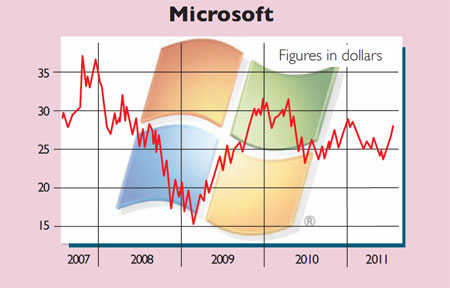
What is Microsoft?
Microsoft is synonymous with the personal computer (PC), its Windows PC operating system and its Office software suite. On the web, the company’s presence includes the Internet Explorer browser, search engine Bing and the MSN portal. It also has a dominant position in the business server market (via Windows Server and Microsoft SQL) and offers the Xbox 360 console for gaming purposes.
What is the company’s history?
Founded by Bill Gates and Paul Allen in 1975, Microsoft came to prominence in the early 1980s with its disk-operating system (DOS), used on IBM computers. The first version of Windows was launched in 1985; MS Office followed in 1990. The mid-1990s saw the launch of Internet Explorer, and in 2001, the Xbox. In recent years, Microsoft has been criticised for failing to innovate, lagging rivals such as Apple, Google and Facebook, who have led the markets in tablet computers, internet search engines, smartphones and social networks.
Who runs Microsoft?
Bill Gates has stepped aside from day-to-day operations but still remains chairman. Steve Ballmer joined in 1980 and was appointed chief executive in 2000. He was paid $1.3m in 2010. Paul Klein is the chief financial officer.
How’s trading?
Pretty good: the year to June 2011 saw record results for the company. Revenue rose by 11.9% to $69.94bn; operating profits grew by 12.7% to $27.16bn. Earnings per share came in at $2.69. Over the year the company paid out $5.2bn in dividends and bought $11.6bn of its own shares. Very strong sales of MS Office 2010, growth in server and tool revenues, and buoyant Xbox sales all helped. Online services continue to lose money as Bing has yet to deliver profitable sales. The core Windows business declined slightly amid weak consumer PC markets.
What’s the outlook?
Microsoft expects 3%-5% growth in operating profits in 2012. The longer term is a tougher call. Microsoft’s demise has been predicted many times, yet even the development of open office software hasn’t ended the dominance of MS Office. The threat from cloud computing (using the internet more and PCs less), tablet devices and social networks concerns investors. In response Microsoft has set up partnerships with Nokia and Facebook and is investing in its Windows Azure cloud platform.
The analysts
Of the 35 analysts surveyed by Bloomberg, 68% say “buy”, 29% “hold” and 3% “sell”. The average price target is $32.87 – 18% above the current share price. Most bearish is Robert Jakobsen of Jyske Bank with a $25 target. Tim Klasell of Stifel Nicolaus has the highest target of $37. Our view: cheap on a 2012 p/e of around ten times. With its strong market positions, squeaky-clean balance sheet, a policy of returning large amounts of cash to shareholders and a possible break-up that could release lots of value, Microsoft is worth tucking away.
The numbers
Stockmarket code: MSFT
Share price: $27.80
Market cap: $235bn
Net assets (June 2011): $57.1bn
Net cash (June 2011): $40.9bn
P/e (current year estimate): 10.0
Yield (prospective): 2.50%
Directors’ dealings
Both Bill Gates and Steve Ballmer have sold large amounts of stock during the last year. Total sales were over 150 million shares (see chart, above) as Gates raised funds for his charities. But both retain hugely valuable holdings as the table shows. And Microsoft has strong corporate governance guidelines on share ownership. The CEO must hold tentimes base pay in stock while divisional presidents and the chief operating officer must hold five times base pay.
Director and shares held
Bill Gates: 560,977,595
Steve Ballmer: 333,252,990
Steven Sinofsky: 737,951
Peter Klein: 180,240
Stephen Elop: 261,302
Brian Turner: 714,801